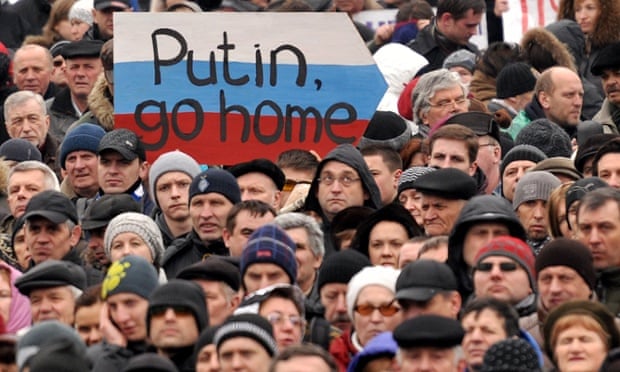A campaign of censorship and intimidation targets Tatars and Ukrainians who do not endorse Kremlin control.
On March 18, 2014, the Kremlin followed its illegal invasion of Crimea by officially annexing the peninsula. Crimea then faded from the headlines once Russia began its war in eastern Ukraine. That’s unfortunate because Russia is perpetrating human-rights abuses in Crimea that go underreported in the West in no small part due to the Kremlin’s efforts to hide them.
 |
| Gunmen block the entrance to the Crimean Parliament building in Simferopol, March 1, 2014. The poster reads ‘Crimea Russia.’ Photo: Ivan Sekretarev/AP |
The annexation of Crimea marked the first time since the end of World War II that borders in Europe were changed by unilateral military force. President Vladimir Putin initially justified this blatant violation of Russia’s legal commitments and international law by claiming that the people of Crimea wanted to join Russia and were subject to repression by the government that took power when Ukraine’s unpopular President Viktor Yanukovych fled Kiev last February. More recently, in a forthcoming Russian TV documentary, Mr. Putin admitted ordering the annexation before a highly dubious referendum on the issue.
 |
| Pro-Russian stands guard at Voting booths. See Through vote containers. HOW'S THAT FOR INTIMIDATION? |
His claims about the desires of the citizenry and Ukraine’s repression are false. First, polls taken before the Russian invasion showed that only about 40% of Crimeans favored either independence from Kiev or joining Russia. Russian officials claimed that the “referendum” on March 16, 2014, conducted by the Kremlin and without independent international observers resulted in a 83% turnout, with 97% voting in favor of annexation. Yet the website of the President of Russia’s Council on Civil Society and Human Rights reported that turnout was only 30%-50%, with 50%-60% in favor of annexation.
 |
| Members of Crimea'a Tartar Population |
Second, instead of improving human rights, Mr. Putin’s aggression has ramped up repression. Before the Kremlin’s invasion, the respect for political rights and civil liberties in Crimea and elsewhere in Ukraine was far from ideal. But there was an active civic life for ethnic Russians, Ukrainians and Tatars and adherents to all religions. The press was free and diverse. But a report this month by the Atlantic Council and Freedom House, “Human Rights Abuses in Russian-Occupied Crimea,” dissects a system designed to keep in check all groups that do not endorse Kremlin control.
 |
| Tatar leader Mustafa Dzhemilev |
The primary victims are the Tatars, a Turkic people who make up at least 12% of the population. Tatar leader Mustafa Dzhemilev, a famed Soviet-era dissident, has been forced into exile, along with other Tatar leaders. Thanks to common Kremlin tools of control—intimidation, harassment and selective application of the law—activists, journalists and religious leaders have been routinely detained, illegally searched and physically abused by Russian authorities. Based on interviews with Crimean residents, and reporting by Ukrainian civil society organizations and local media outlets, the report documents individual and group cases of abuse.Read the rest of the story HERE.
If you like what you see, please "Like" us on Facebook either here or here. Please follow us on Twitter here.


No comments:
Post a Comment